Jerry Lee Lewis, flamboyant and controversial rock and roll pioneer, dead at 87
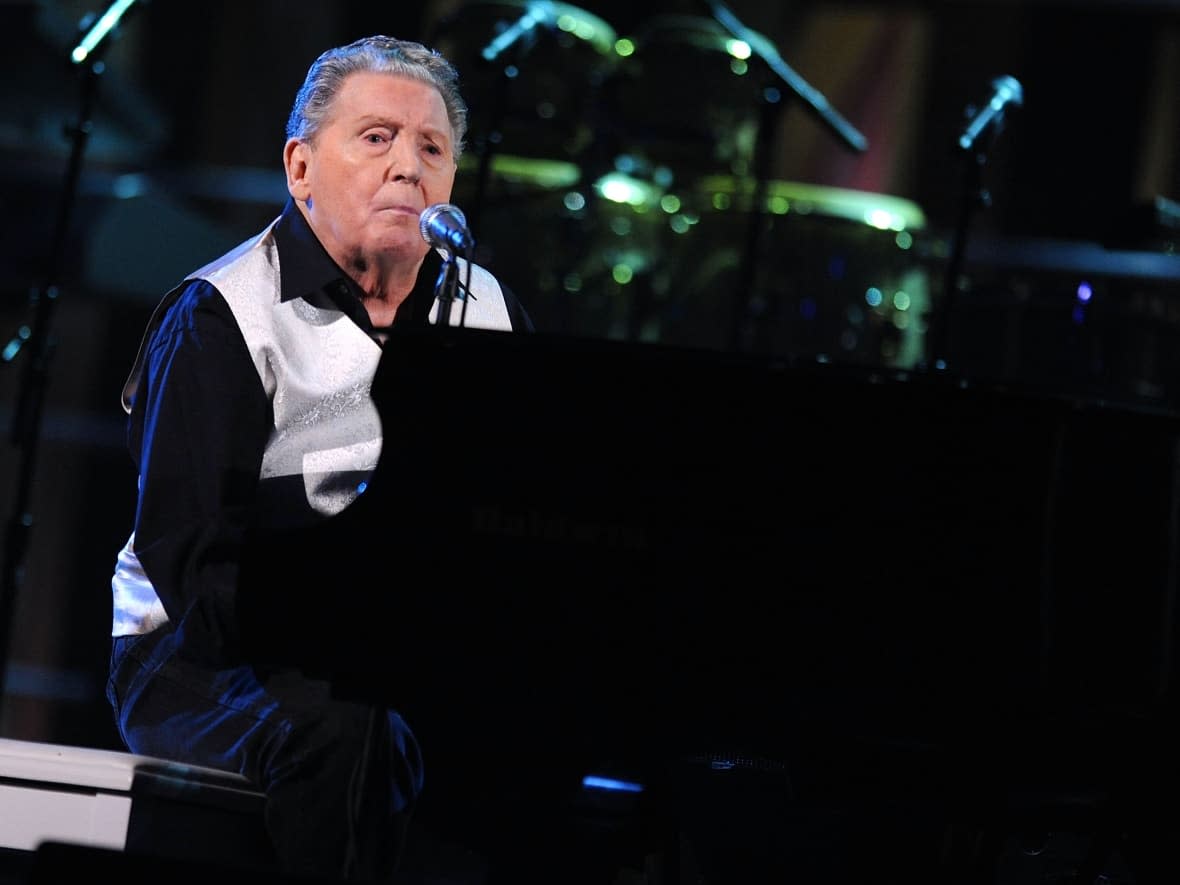
Jerry Lee Lewis, the hard-living, hard-playing pianist and singer whose offstage exploits often grabbed as much attention as his electrifying performances and genre-spanning recording career, has died. He was 87.
The last survivor of a generation of groundbreaking performers that included Elvis Presley, Chuck Berry and Little Richard, Lewis died at home in Memphis, Tenn., representative Zach Farnum said in a release.
Lewis had suffered a minor stroke in 2019 but frequently performed live shows until then. More recently, he was unable to attend his Country Music Hall of Fame induction due to illness.
Lewis's legacy was largely established on the mostly raucous sides cut over a three-year period at Sun Records in Memphis: Whole Lotta Shakin' Goin' On, Great Balls of Fire, Breathless and High School Confidential.
A serendipitous session there of future music legends on Dec. 4, 1956 would also loom large — with the songs recorded by the so-called Million Dollar Quartet of Lewis, Elvis Presley, Johnny Cash and Carl Perkins sold and repackaged in the ensuing decades.
Lewis's appeal to baby boomer kids entranced by the new genre called rock 'n' roll was boosted by manic performances on The Steve Allen Show and in the motion picture High School Confidential. Lewis's hair flipped and flopped as he pounded the keys, yipped and yodelled, kicked the piano bench aside and played standing up or even with his feet.
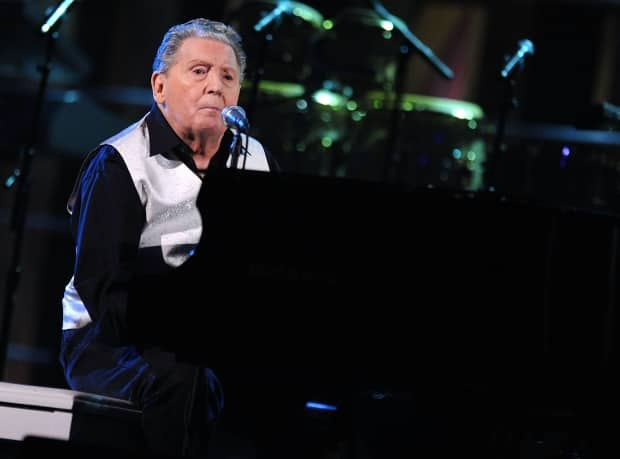
"The Killer" — Lewis's nickname stemming from a colloquial childhood greeting — was inducted into the inaugural 1986 class of the Rock and Roll Hall of Fame and received a Grammy lifetime achievement award.
Not a prolific songwriter, Lewis received credit for putting his definitive stamp on songs that originated across genres -- R&B, country, gospel, he loved it all.
Scandalous marriage
Lewis's life played out like a Southern Gothic novel manuscript rejected for being too over the top.
There were seven marriages, a near-fatal shooting, perennial IRS troubles due to tax delinquency and habitual car crashes, including an infamous 1976 arrest in which a pistol-packing Lewis crashed his Lincoln into the gates of old friend Presley's Graceland mansion.
"I am just what I am — Jerry Lee 'F--k Up' Lewis," he told the BBC in a 1990 documentary. "If you don't like that, you can kiss my ass."
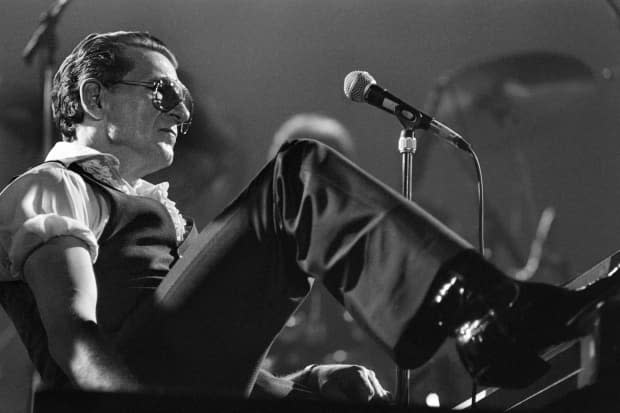
While Lewis enjoyed a recording career that spanned more than six decades, radio airplay largely stopped when it was learned in 1958 that he had married the 13-year-old daughter of his bandmate and cousin, J.W. Brown, on Dec. 12, 1957.
Myra Gale Brown's account of their tumultuous 13-year marriage was told in 1982's Great Balls of Fire: The Uncensored Story of Jerry Lee Lewis, the inspiration for a major motion picture seven years later starring Dennis Quaid as Lewis and Winona Ryder as Brown.
Mysterious death
The couple's three-year-old son, Steve Allen Lewis, drowned in 1963, while a decade later Jerry Lee Lewis, Jr., the oldest of six Lewis children, was killed in a vehicle accident at the age of 19.
Journalist Richard Ben Cramer, in one of the most famous Rolling Stone longform pieces, questioned in 1984 if Lewis had embodied his nickname to deadly consequence after his fifth wife, Shawn Stephens, died the previous year at his Nesbit, Miss., ranch at the age of 26 years, and just 77 days into their marriage.
When first responders arrived, Cramer reported, Lewis greeted them with slurred speech, a bathrobe stained with dried blood and scratches on his hand. Stephens's death was ruled a methadone overdose, and a grand jury refused to indict Lewis, but the investigation was deemed substandard by both Cramer and Geraldo Rivera of TV news magazine program 20/20.
"I loved her with all my heart and soul. There's no way that Jerry Lee Lewis could ever, and would ever, even think of taking another person's life," Lewis said on 20/20, explaining that the blood and scratches were from punching a wall in anguish over her death.
Hardscrabble rural upbringing
Jerry Lee Lewis was born at the height of the Great Depression in Ferriday, La., on Sept. 29, 1935, one of four children. When not travelling, he spent nearly his entire life in the heart of the Mississippi Delta.
Lewis's father picked cotton and did a short stint in jail for selling liquor illegally. The family dwelling had no electricity or indoor plumbing, and when Lewis was a small child, his older brother was killed by a drunk driver.
Respite from the hard life came largely from extended family gatherings where music was performed.
"There's a lot of piano players in my family and a lot of singers. You're either a preacher or a rock and roll singer," Lewis told CBC's Good Rockin' Tonite in 1989. "I chose rock and roll."

Despite the challenging circumstances, four members of his extended family achieved some degree of fame. Linda Gail Lewis, his sister, and cousin Mickey Gilley were also recording artists, and another cousin, Jimmy Swaggart, became one of the most famous American televangelists.
Pentecostal church services Lewis attended as a child made a lifelong imprint. Throughout his life and all the hellraising that would ensue, he was preoccupied with whether "salvation" would occur at his mortal life's end.
At the age of eight, he displayed an aptitude for music, inspiring his dad, Elmo, and mother, Mamie, to spend more than they had to buy him a standup Starck piano. He was largely self-taught, but a wide range of artists fuelled his passion, with Hank Williams and B.B. King his favourites.
'That boy can go'
Lewis played community events beginning in his teens and snuck into clubs, with neither academia nor a stint in Bible school holding lasting interest. His wide-legged style at the piano bench was reportedly due to a hip injury playing football.
He heard about the exploits of Presley at Sun Records and made a pilgrimage in the waning months of 1956. By that time he had been through a series of menial jobs and nighttime gigs, as well as receiving a rejection from RCA Records, whose staff were reportedly flummoxed that he didn't play the guitar.
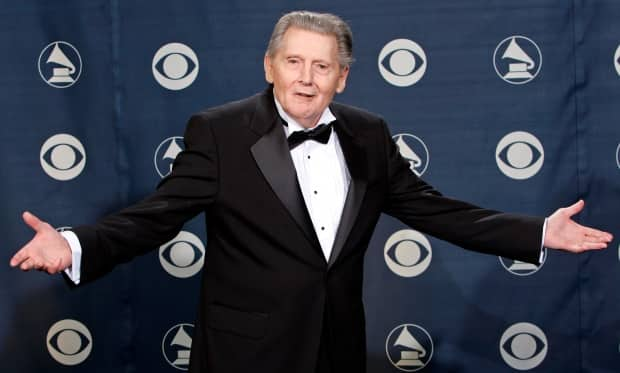
"Nothing could stop me. I was going to be heard and get recorded," he told Vintage Rock magazine. "I knew, if I got to Sun, it would happen."
A reporter was on hand for the studio session of future legends Cash, Perkins, Presley and Lewis.
"That boy can go," Presley told the scribe. "I think he has a great future ahead of him. He has a different style, and the way he plays piano just gets inside me."
In less than two years, Great Balls of Fire, Whole Lotta Shakin' Goin' On and Breathless were all top-10 hits on Billboard's main chart.
Aged 22 and on his third marriage, Lewis's union with a 13-year-old was, regrettably, not without precedent in rural communities of the Deep South at the time. His own sisters were married at 14 and 12, while he was 16 when he married for the first time.
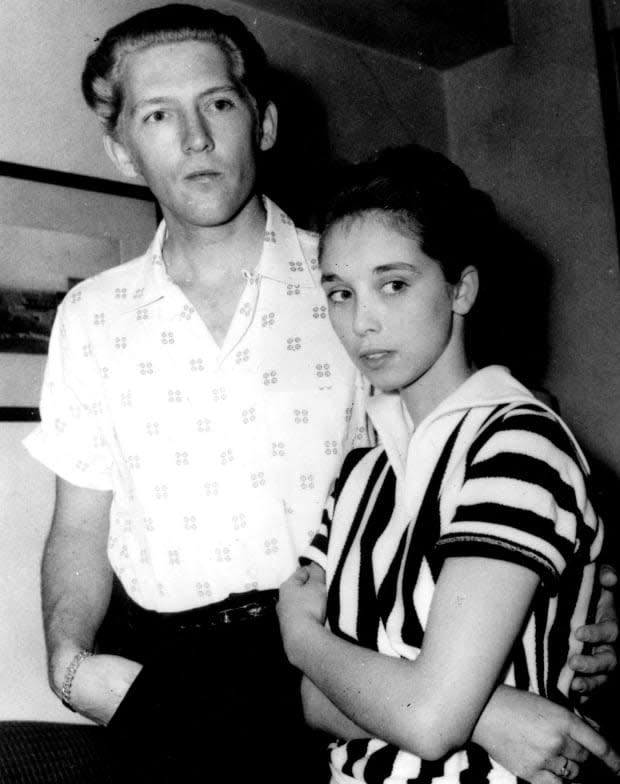
At a 1959 court appearance regarding tardy child support payments to his second wife, Lewis explained to a judge that gigs had dried up due to being branded a "cradle snatcher."
He played the club and tavern circuit for much of the 1960s, including Café Pagoda in Montreal and Toronto's Le Coq d'or Tavern, appearing on a bill with younger musicians like John Lennon and Eric Clapton at the Toronto Rock and Roll Revival in 1969.
During the 1970s, he found the charts again as a country performer, with songs such as What's Made Milwaukee Famous (Has Made A Loser Out of Me) and To Make Love Sweeter for You.
Lewis being Lewis, trouble was never far off. With drinks flowing in 1976, he nearly killed his bass player, Butch Owens, with a .357 — he said he was aiming the gun at a Coke bottle. Lewis was forced to pay damages to Owens and sentenced to probation.
"I just know it took him a couple days to talk right," Lewis told biographer Rick Bragg decades later.
After Presley's 1977 death, it was learned at a subsequent trial that both he and Lewis were avid customers of pill-pushing Dr. George Nichopoulos. Dr. Nick, as he became known, testified that amphetamines were Lewis's particular weakness and that Lewis once discharged himself from a hospital by climbing out a window.
Around the same time — and not for the last time — Lewis was forced to hawk a number of luxury items to satisfy tax debts owed to Uncle Sam.
In 1981, the wear-and-tear of alcohol and drug use led to stomach surgery and a subsequent bout of pneumonia, leaving him in serious condition for a time.
It was at a show the following year at the Hyatt Regency hotel in Dearborn, Mich., where he met Stephens, a waitress.
Richard Ben Cramer's 1984 Rolling Stone article, The Strange and Mysterious Death of Mrs. Jerry Lee Lewis, was lurid. The writer pointed out that Lewis's fourth wife, Jaren, drowned in 1982, though the article didn't mention that the performer was nowhere near the scene of that tragedy.
Both Cramer and Geraldo Rivera alleged there had been abuse in the short marriage to Stephens.
"She wasn't beaten at all. There wasn't a touch of circumstantial evidence that I done it," Lewis told Bragg in 2014's Jerry Lee Lewis: His Own Story.
'Jerry Lee won't be tamed'
Lewis's reputation took a hit, and a series of erratic performances didn't help. He was a no-show at an oldies revue in Toronto's brand new SkyDome in 1989, and four years later, he kicked a cameraman in Spain.
In her book, Myra Gale Brown said Lewis would subject her "to every type of physical and mental abuse imaginable" during their marriage, and neither were fans of 1989's Great Balls of Fire.
"I played him really as a nine-year-old boy who fell in love with music, which he still is," Quaid told Vogue in a promotional interview for the film.
In the last three decades of his life, Lewis still enjoyed the rush of the stage, no matter if it was a club that had seen better days or a casino amphitheatre.
After a decade break from recording, 2006's Last Man Standing ushered in three well-received albums in the 21st century chock-full of guest spots from the likes of B.B. King, Mick Jagger, Neil Young, Sheryl Crow and Willie Nelson.
As Hutch Hutchinson, a bandmate for more than four decades at the time, told the New York Times in 2006: "Jerry Lee won't be tamed. He doesn't answer to anybody, never has."


